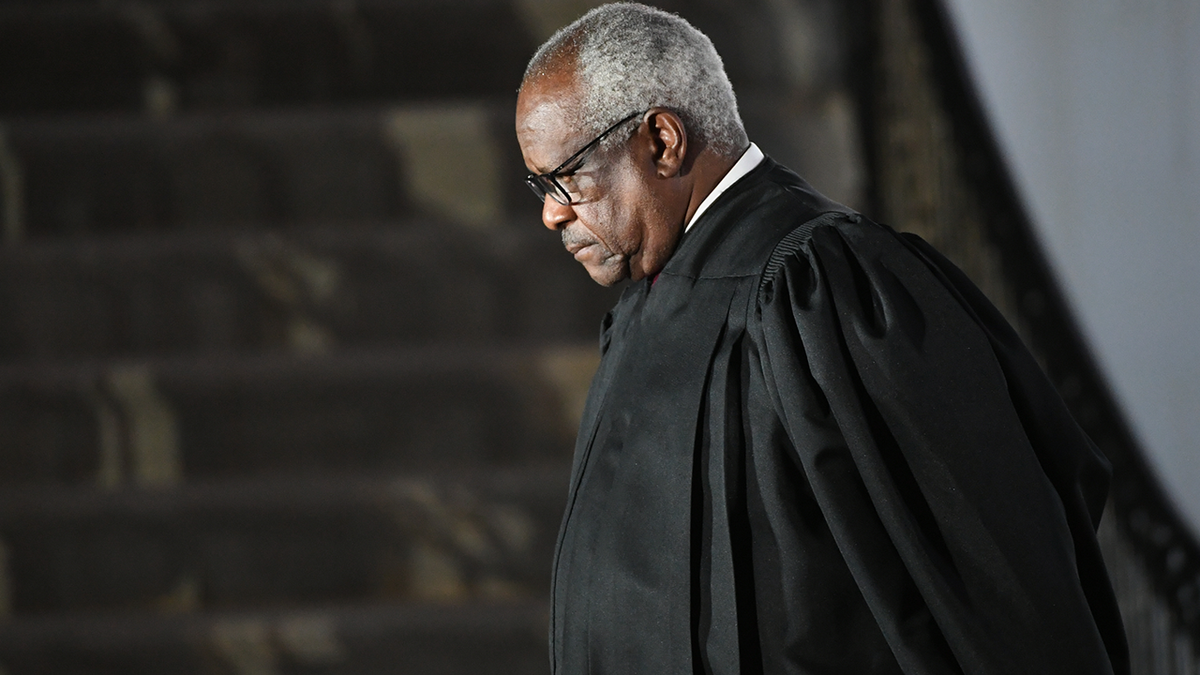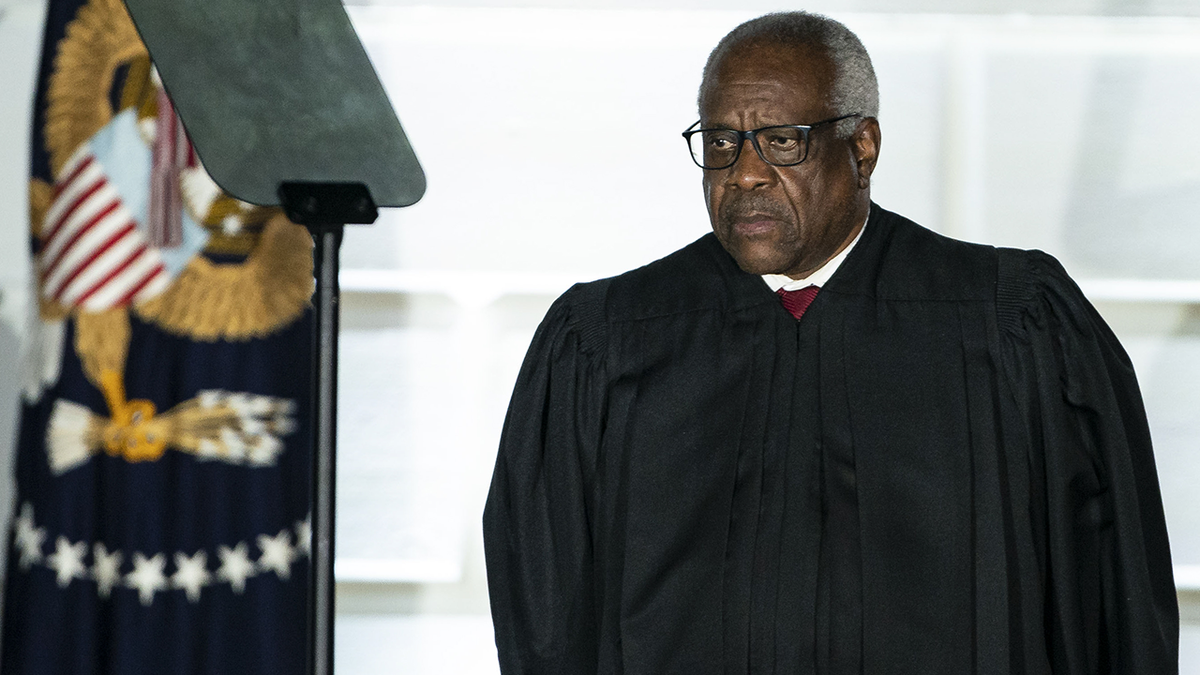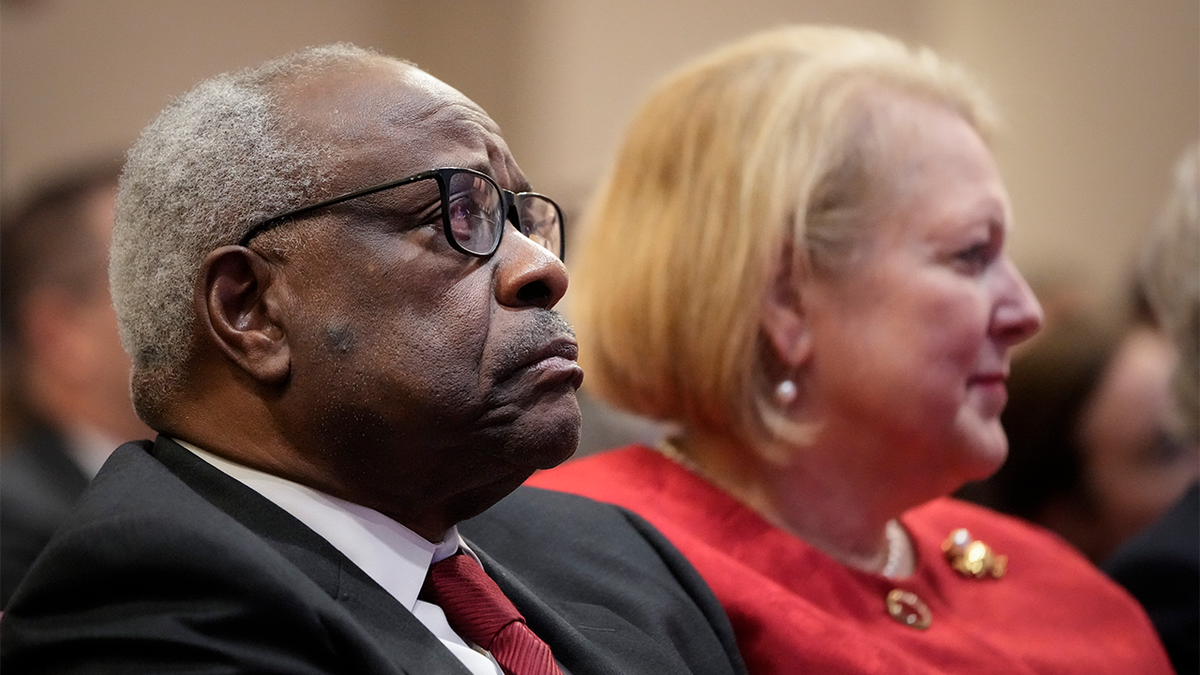by Brianna Herlihy
112 of Justice Thomas' former clerks say news stories attacking him are 'part of larger attack on the Court' and its 'legitimacy'
EXCLUSIVE – Over 100 former clerks of Supreme Court Justice Clarence Thomas wrote an open letter defending him after recent news articles accused him of bending court ethics, saying that his "integrity is unimpeachable" and "his independence is unshakable."
"As his law clerks, we offer this response. Different paths led us to our year with Justice Thomas, and we have followed different paths since. But along the way, we all saw with our own eyes the same thing: His integrity is unimpeachable," the letter reads.
"And his independence is unshakable, deeply rooted seven decades ago as that young child who walked through the door of his grandparents’ house for a life forever changed," they wrote.
The 112 signatories on the letter include current solicitors general, general counsels, partners at litigation firms and law professors. Three circuit court judges also signed the letter: David Stras on the 8th Circuit, Jim Ho of the 5th Circuit, and Allison Rushing, 4th Circuit.

Justice Clarence Thomas listens during a ceremony on the South Lawn of the White House on Oct. 26, 2020. (Al Drago/Bloomberg via Getty Images)
The lawyers described Justice Thomas’ upbringing, having "descended from West African slaves and born to a young mother, not more than 20, in segregated Georgia."
"His father left. And a fire took all he had and the shack where he lived," they described.
The clerks wrote how Thomas as a child later packed all his belongings in "a half-filled paper grocery bag" to live with his grandparents, who enrolled him in a segregated Catholic school run by Irish nuns.
READ IT: Open letter from 112 former clerks of Justice Clarence Thomas:
On the U.S. Supreme Court is a Justice descended from West African slaves and born to a young mother, not more than 20, in segregated Georgia. Home was Pin Point, among the Gullah-Geechee and oysters and marshlands. His father left. And a fire took all he had and the shack where he lived.
He was sent to Savannah along with his brother. They lived in their mother’s one-room tenement. Then, still just a child, taking all his belongings in a half-filled paper grocery bag, he went to live with his grandparents, Myers and Christine Anderson. It was the longest and most significant journey of his life. He and his brother flushed the indoor toilet every time they walked by. The kitchen refrigerator dazzled them.His grandfather enrolled him in a Catholic school run by Irish nuns. It was a segregated school of
only black children. The Klan marched through Savannah. And Forsyth Park was for whites only.
During the summers, he sawed trees by hand and plowed behind a horse named Lizzie at his grandfather’s farm—a farm owned since freedom came at long last to his family.
He chose the seminary to finish school, set on becoming a priest. He was at times the only black seminarian among a sea of white faces. Then came 1968. King was assassinated. Then Kennedy. It transformed him. He left behind hopes of the priesthood. He found Black Power. He wrote about revolution. He protested.
He went to law school. He became a father. He worked for legal aid. He saw forced busing and violence and insolence in South Boston. He devoted himself to doing better for his son.
He took the road less traveled. He went to work for Republican Jack Danforth in the middle of Missouri. It was his only job offer. Years later, he went to Washington, D.C. He joined the Reagan administration. He pulled at every thread of his country’s founding and its history—a country that had simultaneously enslaved his ancestors while declaring “all men are created equal.” He became a judge. And ultimately, a Justice.
This is the story of Justice Clarence Thomas. It is a story that should be told in every American classroom, at every American kitchen table, in every anthology of American dreams realized.
It is a story we’ve heard told from the man himself, for it is the story of our former boss. We are his former law clerks. We’ve had a front-row seat to the Justice at work. Justice Thomas is a man of greatest intellect, of greatest faith, and of greatest patriotism. We know because we lived it. He is a man of unwavering principle. He welcomes the lone dissent. He is also a man of great humor and warmth and generosity. Walk the halls, and you’ll hear his laugh. Call, and he answers. His grandfather’s sayings become our sayings. His chambers become our chambers—a place fueled by unstoppable curiosity and unreturned library books, all to get every case just right. Those chambers
become a way station for other Justices’ clerks too—a place where wisdom is freely shared by the man who made his way from Pin Point to the Supreme Court’s marbled halls.
And yet, the stories most often told of Justice Thomas are not these. The Justice is ever the subject of political headlines taking aim at his character, his judicial philosophy, his marriage, even his race. They attempt to write over his actual story. Lately, the stories have questioned his integrity and his ethics for the friends he keeps. They bury the lede. These friends are not parties before him as a Justice of the Court. And these stories are malicious, perpetuating the ugly assumption that the Justice cannot think for himself. They are part of a larger attack on the Court and its legitimacy as an institution. The picture they paint of the Court and the man for whom we worked bears no resemblance to reality.
As his law clerks, we offer this response. Different paths led us to our year with Justice Thomas, and we have followed different paths since. But along the way, we all saw with our own eyes the same thing: His integrity is unimpeachable. And his independence is unshakable, deeply rooted seven decades ago as that young child who walked through the door of his grandparents’ house for a life forever changed.
Justice Thomas has never strayed from those beginnings. A bust of his grandfather—himself raised by a grandmother born into slavery—watches over his office. It is an ever-present reminder that he is no ordinary Justice. Come the first Monday in October, the Justice, born into poverty few can fathom and educated in a segregated Savannah school room, will take the bench and begin his thirty-third year on the U.S. Supreme Court. He will ask a question most haven’t considered. And he will cast his votes and write opinions based on his mind alone.
We are proud to have been his clerks and to remain his friends, and we unequivocally reject attacks on his integrity, his character, or his ethics.
Bijan Aboutorabi
John Adams
Russell Balikian
Matthew Berry
Steven G. Bradbury
David A. Bragdon
Christine M. Buzzard
Madeline W. Clark
Jonathan Cohn
Philip M. Cooper
Michael Corcoran
Richard M. Corn
Steven T. Cottreau
Brendan P. Cullen
Gilbert Dickey
Jennifer B. Dickey
Josh Divine
Victoria Dorfman
Robert Dunn
John C. Eastman
John A. Eisenberg
Claire Evans
Chantel Febus
Andrew N. Ferguson
Matthew A. Fitzgerald
Janet Galeria
Laurie Gallancy
Nicole Stelle Garnett
James E. Gauch
Christopher C. Goodnow
Eric Grant
Tyler R. Green
Jennifer Hardy
Sarah M. Harris
Dan Himmelfarb
James C. Ho
John M. Hughes
Laura Ingraham
Erik S. Jaffe
Ashley E. Johnson
Eric J. Kadel, Jr.
Brittney Lane Kubisch
Christopher Landau
Brian Charles Lea
Thomas R. Lee
Brandt Leibe
Robert Leider
Elbert Lin
Caroline Cook Lindsay
Steven J. Lindsay
Brian M. Lipshutz
Wendy Stone Long
Arthur S. Long
Brinton Lucas
Sigal Mandelker
Kevin Marshall
Jennifer L. Mascott
Eric McArthur
Diane McGimsey
Marah Stith McLeod
Taylor A.R. Meehan
Gregory F. Miller
Jack L. Millman
Christopher Mills
Kasdin Mitchell
Kathryn Kimball Mizelle
David Morrell
Brian P. Morrissey
Adam K. Mortara
Eric C. Nelson
Matthew B. Nicholson
Cameron T. Norris
Patrick L. O'Daniel
Michael O'Neill
Martha M. Pacold
Elizabeth Papez
William Peterson
Patrick F. Philbin
Sai Prakash
Craig Primis
M. Scott Proctor
Haley N. Proctor
Austin L. Raynor
Matt Rice
Rebekah Ricketts
Allison J. Rushing
Ann Scarlett
Brian Schmalzbach
Carrie Campbell Severino
Daniel Shapiro
Arnon D. Siegel
Kristen Silverberg
Laura Wolk Slavis
Hannah Smith
Jacob T. Spencer
Robert Stander
Scott G. Stewart
David Stras
Michelle S. Stratton
Patrick Strawbridge
Heath P. Tarbert
Karl Tilleman
Kate Todd
Amy Upshaw
Jonathan D. Urick
Manuel Valle
Helgi Walker
Jeffrey B. Wall
Henry C. Whitaker
John F. Wood
Katherine Yarger
John Yoo
Set on becoming a priest, Thomas chose seminary to finish school. "He was at times the only black seminarian among a sea of white faces," they wrote.
"Then came 1968. King was assassinated. Then Kennedy. It transformed him. He left behind hopes of the priesthood. He found Black Power. He wrote about revolution. He protested," they described.
"He went to law school. He became a father. He worked for legal aid. He saw forced busing and violence and insolence in South Boston. He devoted himself to doing better for his son.

Justice Clarence Thomas at the swearing in of Judge Amy Coney Barrett is as the 115th justice to the Supreme Court. (Jonathan Newton /The Washington Post via Getty Images)
"He took the road less traveled," the lawyers wrote.
When he eventually went to Washington, D.C., Thomas "pulled at every thread of his country’s founding and its history – a country that had simultaneously enslaved his ancestors while declaring ‘all men are created equal,’" they wrote.
The former clerks described having a "front-row seat" to Thomas at work, calling him "a man of greatest intellect, of greatest faith, and of greatest patriotism."
"He is a man of unwavering principle. He welcomes the lone dissent. He is also a man of great humor and warmth and generosity. Walk the halls, and you’ll hear his laugh. Call, and he answers," they said.
"His grandfather’s sayings become our sayings. His chambers become our chambers – a place fueled by unstoppable curiosity and unreturned library books, all to get every case just right," they stated, adding that his chambers "become a way station" for other justices’ clerks too.
"And yet, the stories most often told of Justice Thomas are not these. The Justice is ever the subject of political headlines taking aim at his character, his judicial philosophy, his marriage, even his race. They attempt to write over his actual story," the former clerks charged.
"Lately, the stories have questioned his integrity and his ethics for the friends he keeps. They bury the lede. These friends are not parties before him as a Justice of the Court. And these stories are malicious, perpetuating the ugly assumption that the Justice cannot think for himself," they stated.

Supreme Court Justice Clarence Thomas sits with his wife Virginia Thomas while he waits to speak at the Heritage Foundation on Oct. 21, 2021, in Washington, D.C. (Drew Angerer/Getty Images)
"They are part of a larger attack on the Court and its legitimacy as an institution. The picture they paint of the Court and the man for whom we worked bears no resemblance to reality," they said.
Earlier this year, Pro Publica published a report that GOP megadonor Harlan Crow paid for vacations for Justice Thomas, including travel on a private jet. Another reporter by the same outlet revealed that Thomas' great-nephew, whom Thomas and his wife had taken into their care in 1997, had his tuition paid for by Crow at two private schools. The New York Times published a report that Thomas once accepted a Super Bowl ring from billionaire Dallas Cowboys owner Jerry Jones.
Thomas, defending himself, said he has "endeavored to follow that counsel throughout my tenure, and have always sought to comply with the disclosure guidelines."
"These guidelines are now being changed, as the committee of the Judicial Conference responsible for financial disclosure for the entire federal judiciary just this past month announced new guidance. And, it is, of course, my intent to follow this guidance in the future," he said in a statement.
Senate Democrats jumped on the reports, calling Thomas’ adherence to court ethics rules into questions, and floated that he should recuse himself from certain cases.
Rep. Alexandria Ocasio-Cortez, D-N.Y., said Attorney General Merrick Garland should investigate Thomas.
But Republicans say the criticism is party politics. Sen. Lindsay Graham, R-S.C., said the "assault on Justice Thomas is well beyond ethics. It's about trying to delegitimize a conservative court that was appointed through the traditional process."
The former clerks concluded that, "[c]ome the first Monday in October, the Justice, born into poverty few can fathom and educated in a segregated Savannah school room, will take the bench and begin his thirty-third year on the U.S. Supreme Court."
Brianna Herlihy
Source:https://www.foxnews.com/politics/over-100-former-clerks-justice-thomas-sign-open-letter-defending-his-integrity-independence
No comments:
Post a Comment